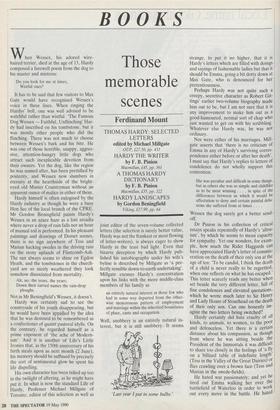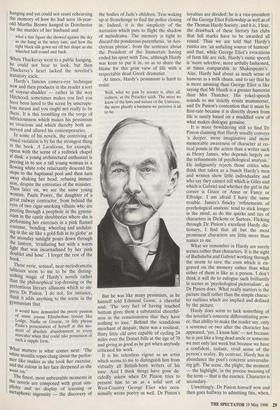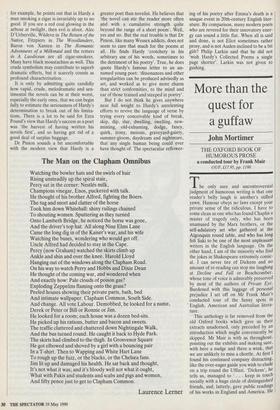BOOKS
Those memorable scenes
Ferdinand Mount
THOMAS HARDY: SELECTED LETTERS edited by Michael Millgate
OUP, £27.50, pp. 433
HARDY THE WRITER by F. B. Pinion
Macmillan, £45, pp. 361
A THOMAS HARDY DICTIONARY by F. B. Pinion
Macmillan, £35, pp. 322
HARDY LANDSCAPES by Gordon Beningfield
Viking, £17.99, pp. 64
When Wessex, his adored wire- haired terrier, died at the age of 13, Hardy composed a farewell poem from the dog to his master and mistress:
Do you look for me at times, Wistful ones?
It has to be said that few visitors to Max Gate would have recognised Wessex's voice in these lines. When ringing the Hardys' bell, one was well advised to be watchful rather than wistful. 'The Famous Dog Wessex — Faithful, Unflinching' Har- dy had inscribed on his tombstone, but it was mostly other people who did the flinching. There was not much to choose between Wessex's bark and his bite. He was one of those horrible, snappy, aggres- sive, attention-hungry little dogs who attract such inexplicable devotion from their owners. Yet the dog, like the region he was named after, has been prettified by posterity, and Wessex now slumbers in eternity at the hearthside of the bright- eyed old Master Countryman without an apparent ounce of malice in either of them.
Hardy himself is often eulogised by the Hardy industry as though he were a busy Hon Sec of the local branch of the CPRE. Mr Gordon Beningfield paints Hardy's Wessex in an azure haze as a lost arcadia where never a drop of rain falls nor an hour of manual toil is performed. In his pleasant paintings and drawings of Dorset scenes, there is no sign anywhere of Tess and Marian hacking swedes in the driving rain on the stony uplands of Flintcomb-Ash. The sun always seems to shine on Egdon Heath, and the tombstones in the church- yard are so nicely weathered they look somehow dissociated from mortality.
Ah, no; the years, the years; Down their carved names the rain-drop ploughs.
Not in Mr Beningfield's Wessex, it doesn't.
Hardy was certainly sad to see the countryside of his youth disappearing, but he would have been appalled by the idea that he was destined to be remembered as a confectioner of quaint pastoral idylls. On the contrary, he regarded himself as a prime exponent of 'the ache of Modern- ism'. And it is another of Life's Little Ironies that, as the 150th anniversary of his birth steals upon us next month (2 June), his memory should be suffused by precisely the sort of sentimental glow he spent his life dispelling.
His own character has been tidied up too in the twilight of aftering, as he might have put it. In what is now the standard Life of Hardy, Professor Michael Millgate of Toronto, editor of this selection as well as joint editor of the seven-volume collected letters (the selection is surely better value, Hardy was not the frankest or most flowing of letter-writers), is always eager to show Hardy in the least bad light. Even that bizarre deception by which Hardy pub- lished his autobiography under his wife's byline is described by Millgate as 'a per- fectly sensible down-to-earth undertaking'. Millgate excuses Hardy's concentration upon his links with the more middle-class members of his family as an entirely natural interest in those few who had in some way departed from the other-• wise monotonous pattern of employment and marriage within the inherited boundaries of place, caste and occupation.
Well, snobbery is an entirely natural in- terest, but it is still snobbery. It seems
'Last year 1 put in some bulbs.'
strange, to put it no higher, that it is Hardy's letters which are filled with doings and sayings of fashionable ladies but that it should be Emma, going a bit dotty down at Max Gate, who is denounced for her pretentiousness.
Perhaps Hardy was not quite such a creepy, secretive character as Robert Git- tings' earlier two-volume biography made him out to be, but I am not sure that it is any improvement to make him out as a good-humoured, normal sort of chap who just wanted to get on with his scribbling. Whatever else Hardy was, he was not ordinary.
Nor were either of his marriages. Mill- gate asserts that 'there is no criticism of Emma in any of Hardy's surviving corres- pondence either before or after her death'. I must say that Hardy's replies to letters of condolence do not wholly support this contention:
She was peculiar and difficult in some things, but in others she was so simple and childlike as to be most winning . . . in spite of the differences between us which it would be affectation to deny and certain painful delu- sions she suffered from at times . . . .
Wessex the dog surely got a better send- off.
Dr Pinion in his collection of critical essays speaks repeatedly of Hardy's 'altru- ism', by which he seems to mean capacity for sympathy. Yet one wonders, for exam- ple, how much the Rider Haggards can have appreciated Hardy's letter of commis- eration on the death of their only son at the age of ten: `To be candid, I think the death of a child is never really to be regretted, when one reflects on what he has escaped. This letter scarcely reads any better when set beside the very different letter, full of fine condolences and elevated quotations, which he wrote much later to Sir Henry and Lady Hoare of Stourhead on the death of their only son. Can one honestly im- agine the two letters being switched?
Hardy certainly did hate cruelty of all kinds, to animals, to women, to the poor and defenceless. Yet there is a certain distance about his compassion, as though from where he was sitting beside the President of the Immortals it was difficult to share too closely in the feelings of 'a fly on a billiard table of indefinite length (Tess in the Valley of the Great Dairies) or flies crawling over a brown face (Tess and Marian in the swede-fields). He hated war passionately; and yet he tired out Emma walking her over the battlefield of Waterloo in order to work out every move in the battle. He hated hanging and yet could not resist rehearsing the memory of how he had seen 16-year- old Martha Brown hanged in Dorchester for the murder of her husband and
what a fine figure she showed against the sky as she hung in the misty rain, and how the tight black silk gown set off her shape as she wheeled half-round and back.
When Thackeray went to a public hanging, he could not bear to look, but then Thackeray's heart lacked the novelist's statutory icicle.
Hardy's famous camera-eye technique now and then produces in the reader a sort of voyeur-shudder — rather in the way Hitchcock sometimes makes you feel you have been lured to the scene by unscrupu- lous means and you ought not really to be there. It is this trembling on the verge of lubriciousness which makes his pessimism so vivacious and which thereby both un- nerved and allured his contemporaries. i In some of his novels, the contriving of visual violation is by far the strongest thing in the book. A Laodicean, for example, opens with the scene of a redbrick chapel at dusk: a young architectural enthusiast is Peering in to see a tall young woman in a flowing white robe reluctantly descend the steps to the baptismal pool and then turn away shaking her head, refusing immer- sion, despite the entreaties of the minister. Then later on, we see the same young woman, Paula Power, the daughter of a great railway contractor, from behind the eyes of two cigar-smoking villains who are peering through a peephole in the gymna- sium in the castle shrubberies where she is performing her exercises in a pink flannel costume, 'bending, wheeling and undulat- ing in the air like a gold-fish in its globe' as the noonday sunlight pours down through the lantern, 'irradiating her with a warm light that was incarnadined by her pink doublet and hose'. I forget the rest of the book.
These eerie, sensual, near-melodramatic tableaux seem to me to be the disting- uishing magic of Hardy's novels rather than the philosophical top-dressing or the pretentious literary allusions which so im- press Dr Pinion. I do not, for instance, think it adds anything to the scene in the gymnasium that
it would have demanded the poetic passion of some joyous Elizabethan lyricist like Lodge, Nashe or Greene, to fitly phrase Paula's presentation of herself at this mo- ment of absolute abandonment to every muscular whim that could take possession of such a supple form.
What matters is what comes next: 'The white manilla ropes clung about the perfor- mer like snakes as she took her exercise, and the colour in her face deepened as she went on.'
The finest, most unbearable moments in the novels are composed with great sim- plicity and no display of learning or metaphoric ingenuity — the discovery of the bodies of Jude's children, Tess waking up at Stonehenge to find the police closing in. Indeed, it is the simplicity of the narration which puts to flight the shadow of melodrama. The memory is right to discard the ponderous parenthesis, 'in Aes- chylean phrase', from the sentence about the President of the Immortals having ended his sport with Tess, although Hardy was keen to put it in, so as to share the blame for this grim view of life with a respectable dead Greek dramatist. At times, Hardy's pessimism is hard to resist:
Well, what we gain by science is, after all, sadness, as the Preacher saith. The more we know of the laws and nature of the Universe, the more ghastly a business we perceive it all to be.
But he was like many pessimists, as he himself told Edmund Gosse, a cheerful soul: 'The very fact of having touched bottom gives them a substantial cheerful- ness in the consciousness that they have nothing to lose.' Behind the scandalous merchant of despair, there was a resilient, flinty little old cove capable of cycling 24 miles over the Dorset hills at the age of 70 and giving as good as he got when anybody criticised his work.
It is his relentless vigour as an artist which seems to me to distinguish him from virtually all British-born writers of his time. And I think things have gone de- cidedly askew when Dr Pinion tries to present him to us as a solid sort of West-Country George Eliot who occa- sionally wrote poetry as well. Dr Pinion's loyalties are divided; he is a vice-president of the George Eliot Fellowship as well as of the Thomas Hardy Society, and it is, I fear, the drawback of these literary fan clubs that full marks have to be awarded all round. Thus we are told that Hardy's rustics are 'an unfailing source of humour' and that, while George Eliot's evocations of farm life are rich, Hardy's rustic speech is 'more selective, more artfully fashioned, at times comparable to Shakespeare's'. Alas, Hardy had about as much sense of humour as a milk churn, and to say that he is more amusing than George Eliot is like saying that Mr Heath is a greater humorist than Mrs Thatcher. His yokel-speech sounds to me strictly ersatz mummerset, and Dr Pinion's contention that it must be first-rate because it is directly drawn from life is surely based on a muddled view of what makes dialogue genuine.
It is more bewildering still to find Dr Pinion claiming that Hardy usually conveys 'a deeper, more imaginative and more memorable awareness of character at cri- tical points in the action than a writer such as Henry James, who depends largely on the refinements of psychological analysis.' He indignantly rejects those critics who think that taken as a bunch Hardy's men and women show little individuality and who say they cannot tell which is Giles and which is Gabriel and whether the girl in the corner is Grace or Anne or Fancy or Elfridge. I am afraid I have the same trouble. James's finicky 'refinements of psychological analysis' tend to stick longer in the mind, as do the quirks and tics of characters in Dickens or Surtees. Flicking through Dr Pinion's excellent Hardy dic- tionary, I find that all but the most prominent characters are little more than names to me.
What we remember in Hardy are surely scenes rather than characters. It is the sight of Bathsheba and Gabriel working through the storm to save the corn which is en- graved on the memory rather than what either of them is like as a person. I don't think it will do to eulogise such brilliantly lit scenes as 'psychological pictorialism', as Dr Pinion does. What really matters is the picture itself rather than the simple charac- ter outlines which are implied and defined by the picture.
Hardy does seem to lack something of the novelist's concrete differentiating pow- er, that ability to make the reader say, only a sentence or two after the character has appeared, 'yes, I know him' — not because he is just like a long dead uncle or someone we met only last week but because we have a confident, instant, vivid sense of the person's reality. By contrast, Hardy has in abundance the poet's concrete universalis- ing gift. The scene, the plight, the moment — the highlight, in the precise meaning of the term — that is the essence. Character is secondary.
Unwittingly, Dr Pinion himself now and then goes halfway to admitting this, when, for example, he points out that in Hardy a man smoking a cigar is invariably up to no good. If you see a red coal glowing in the arbour at twilight, then evil is afoot. Alec D'Urberville, Wildeve in The Return of the Native, Fitzpiers in The Woodlanders, Baron von Xanten in The Romantic Adventures of a Milkmaid and the rotters in A Laodicean are all cigar-smokers. Many have black moustachios as well. This crude symbolism may contribute to superb dramatic effects, but it scarcely counts as profound characterisation.
It is only by admitting quite candidly how vapid, crude, melodramatic and sen- timental the novels can be at their worst, especially the early ones, that we can begin fully to estimate the seriousness of Hardy's determination to break out of his limita- tions. There is a lot to be said for Ezra Pound's view that Hardy's success as a poet was 'the harvest of having written his novels first', and so having got rid of a good deal of surplus baggage.
Dr Pinion sounds a bit uncomfortable with the modern view that Hardy is a greater poet than novelist. He believes that 'the novel can stir the reader more often and with a cumulative strength quite beyond the range of a short poem'. Well, yes and no. But the real trouble is that Dr Pinion, like many Wessex addicts, does not seem to care that much for the poems at all. He finds Hardy 'crotchety in his arbitrary use of his words, sometimes to the detriment of his poetry'. True, he does quote Hardy's famous letter to an un- named young poet: 'dissonances and other irregularities can be produced advisedly as art, and worked as to give more charm than strict conformities, to the mind and ear of those trained and steeped in poetry'.
But I do not think he gives anywhere near full weight to Hardy's unrelenting efforts to revive the language of verse by trying every conceivable kind of break, skip, dip, slur, dwelling, swelling, new- minting, old-exhuming, dodge, fancy, quirk, irony, meiosis, graveyard-gaiety, summer-gloom, daydream and nightmare, that any single human being could ever have thought of. The spectacular reflower-
ing of his poetry after Emma's death is a unique event in 20th-century English liter- ature. By comparison, many modern poets who are revered for their innovatory ener- gy can sound a little flat. When all is said and done, is not Eliot sometimes rather prosy, and is not Auden inclined to be a bit glib? Philip Larkin said that he did not 'wish Hardy's Collected Poems a single page shorter'. Larkin was not given to gushing.




































































 Previous page
Previous page